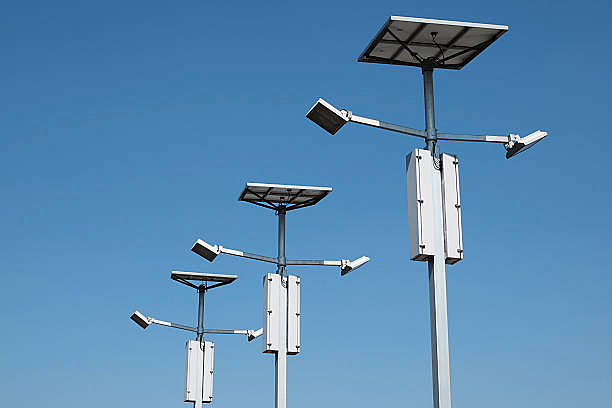In a decisive step towards brighter nights and safer streets, two Chinese construction giants have formally broken ground on the ambitious Light Up Abuja solar streetlighting project. The launch took place on 2 October 2025, with officials, residents, and stakeholders assembling in the Federal Capital Territory to witness the turning of the first switch.
The project is led by China Civil Engineering Construction Corporation (CCECC) and CGCOC Group Co., Ltd., under the mandate of Nigeria’s Federal Capital Territory Administration (FCTA). The aim: to install advanced hybrid solar streetlights across Abuja’s main districts and expressway corridors.
At the event, FCTA Minister Nyesom Wike emphasised the significance of the initiative, pointing out that many existing streetlights in the city have long ceased to function owing to vandalism and neglect. He noted that the new systems are designed with resilience in mind — incorporating surveillance modules and real-time connectivity to a central control room to monitor faults, deter crime, and protect government investments in infrastructure.
Minister Wike described the project as a flagship urban development venture and a tangible outcome of the deepening strategic cooperation between Nigeria and China. He tied it directly to President Bola Tinubu’s state visit to Beijing in September 2024, arguing that the solar lighting drive is both a symbol and substance of the bilateral relationship.
According to project timetables, completion is expected within six to seven months, ahead of Abuja’s 50th anniversary in 2026. The Chinese firms are also contracted to maintain the lighting systems for four to five years after installation.
Guan Shuai, Managing Director of CCECC Nigeria, said the project “captures all the major areas of Abuja.” He stressed that the deliverable is not merely streetlights, but a broader solution to persistent power supply and lighting shortfalls faced by residents.

Table of Contents
Technological edge, security features and urban impact of the Light Up Abuja
What sets this undertaking apart is more than just renewable energy—it’s the intelligent integration of surveillance and control technology. Each hybrid streetlight unit will be equipped with modules that link to a central monitoring hub. This allows authorities to detect vandalism or system failures immediately and dispatch maintenance or security teams proactively.
Officials say this design responds head-on to the challenges that have long plagued Abuja’s streetlighting: wires cut, bulbs stolen, lamps broken, and long delays in repairs. The automated alert systems are expected to deter criminal activity around public lighting infrastructure while improving public safety more broadly.
For the everyday commuter or resident, the contrast is expected to be striking. Once fully operational, many neighbourhoods and express corridors could see consistent illumination at night—something that has been elusive for years. The new lights are also planned to be energy efficient and optimised for durability, reducing maintenance overheads over time.
Urban planners and civic groups see this as more than a lighting upgrade. They view it as a catalyst for night-time economic activity, improved security, and a signal that Abuja is upgrading into a smart, sustainable city. In short, this is infrastructure with both utility and symbolism.
Costs, timelines, and shared responsibilities of the Light Up Abuja project
The project will span all major districts within the FCT, and the contracts are split between CCECC and CGCOC. Each firm has responsibility for different zones and expressway segments, with the obligation not only to install but also to maintain the systems for an extended post-installation period.
The schedule places full delivery at six to seven months, meaning that by mid-2026, much of the city is expected to benefit. The timing is strategic: Abuja’s golden jubilee in 2026 offers a symbolic deadline for completion.
Critically, the arrangement also covers the four-to-five years of maintenance. This is meant to ensure the lighting systems do not fall into disrepair the moment commissioning is done—a common fate for many public infrastructure projects.
While official communications have not so far released the full financial sums, the project is clearly substantial in scale. The reliance on Chinese firms is part of a broader pattern: Nigeria has, in recent years, increasingly leaned on Chinese expertise for large infrastructure projects across energy, roads, rail, and urban systems. The Light Up Abuja project, according to FCTA leadership, reinforces this partnership and positions it as a hallmark of future collaboration.
One component especially emphasised by Guan Shuai is the holistic nature of the solution—not just lighting, but addressing power intermittency and supply gaps. In other words, the project is pitched as not just cosmetic or symbolic, but problem-solving.

Light Up Abuja: Challenges, expectations and what to watch
While the ambitions are high, real risks lie ahead. Abuja’s infrastructure has long been plagued by vandalism, theft of wiring, delayed maintenance, and jurisdictional tugs between agencies. Whether the new surveillance-augmented system will deter those threats—and whether the maintenance contracts will be honoured—is a central test for the project’s success.
The capacity of the FCTA to manage, monitor, and enforce protective protocols will also matter. Even the most advanced hardware will underperform without robust institutional support and community buy-in.
For residents, expectations are high. Many have become accustomed to navigating darkness on poorly lit roads, with attendant risks to personal safety and property. If the project delivers, it could reshape the nocturnal experience of the city and lift burdens—not just restoring light, but confidence.
From a broader perspective, the success or failure of this project will be watched closely. It may serve as a benchmark for further renewable energy and smart city projects across Nigeria and beyond. If “Light Up Abuja” runs smoothly, it could become a blueprint. If delays, technical failures, or misuse of funds emerge, critics will seize on it.
In the months ahead, key signals to monitor will include:
- The pace of installations and whether they adhere to targets
- How promptly the systems respond to faults or damage
- The effectiveness of surveillance and security modules in deterring vandalism
- Whether maintenance is sustained beyond the initial installation
- How local communities perceive and engage with the new infrastructure
Already, the optics are powerful. When the first sample streetlight was lit during the launch ceremony, it was more than a symbolic gesture—it was a signal of intent, a promise of change.

Conclusion
The “Chinese firms launch solar project in Abuja” is not merely a government press release—it is a potential turning point. The road ahead is neither guaranteed nor easy, but the stakes are unmistakable. If the Light Up Abuja initiative lives up to its promise, it could transform Abuja’s nights—and set a new standard for Nigeria’s urban future.
Join Our Social Media Channels:
WhatsApp: NaijaEyes
Facebook: NaijaEyes
Twitter: NaijaEyes
Instagram: NaijaEyes
TikTok: NaijaEyes





